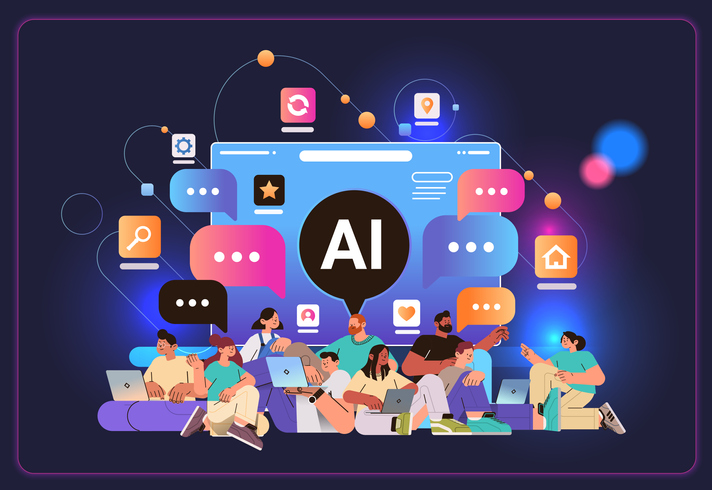SocialAI, a new iOS app, offers a Twitter-like experience where users interact solely with AI bots, creating a unique, human-free social network
In short, SocialAI lets you share your thoughts with unlimited AI-powered bots that are always online and ready to chat back.
When you post something on SocialAI, no one will ever respond with silence, and everyone will respond. It’s impossible to be ghosted. The app’s fake users listen to everything you say and add canned commentary to your answers with programmed enthusiasm. Even the sarcastic, snarky, and pessimistic bots can’t resist joining these endless scroll comment pile-on.
The best part is that you don’t have to worry about real people ruining your mood.
People and AI have worked together on social networks before, but this is a bot network (without you). Since you are the only person in the chatroom, you are automatically “the main character” in your online drama every time you log on.
These days, a world full of bots might sound like a pretty good way to describe Elon Musk’s X (formerly Twitter). The big difference is that on SocialAI, you can be sure it’s always 100% bots. Everything else is not, that’s why.
It is incredibly clear in SocialAI that every person you see is code. It also promises that none of your fake social interactions will be shared with anyone else. Even though the layout looks like old-school social media apps, this isn’t what it seems to be: There are no nosy people in this social place, and there are a lot of AIs to help you explore your interests.
Founder and 28-year-old developer Michael Sayman spent many of his teens working for Facebook, writing code for features that made the app more like Snapchat. He calls the app’s vibe “liberating.” In May 2022, before making a product, his business, Friendly Apps, raised $3M in a “seed round.” When he talks about how people reacted when the app came out late Monday, he is surprised and happy that the MVP caused such a big stir so quickly.

He tells TechCrunch, “It’s been crazy.” „It’s funny because I thought about it for a long time. How should the invite flow look? How should I try to help people? I’d seen other social apps that focused so much on how to get people to share it with their friends… After that, I told myself, “I need to get this done.”
“I believe that it shows how much potential it might have.” So I’m just, I’m stressed out.
Sayman says the idea for SocialAI has been around for years. He wants to create a safe place to share their thoughts and get secret feedback. But it wasn’t until recently that AI technology, especially the big language models that power the boom in creative AI, caught up with his idea of a “private social network” where people can share their ideas with a wide range of AIs.
“I saw these diary and journaling apps out there, but they all felt so empty,” he says. People said they didn’t work differently than a notes app when they used them, which I found…weird. Because of this, I thought there was promise in making something that felt like a magical diary.

Anyone who has used Twitter (or any of its clones) will immediately feel at home with SocialAI. Once you go beneath the surface, though, the standard social media mask will quickly disappear. Yes, you can post comments, reply to comments, and like other people’s comments, just like on any other social app. But the app makes all of your interactions seem real.
People who use SocialAI must choose the “types” of bots that follow them from a long list. This is the most apparent difference between SocialAI and other social apps. Like “trolls,” “oddballs,” “nerds,” “intellectuals,” “Liberals,” “Conservatives,” “Jokesters,” and many more.
You must choose at least three types of followers to fill out your network, but there is no upper limit. If you want to mix things up, you can choose all 32 types of followers available at the start. (Or, at least, as much as a feed of material made by AI can stray from what was planned.) You can also choose to have a few types to keep things simple.
The types you choose will affect the tone of AI’s talk for you. Sayman says the app is also meant to learn and change over time based on the types of people who follow you and the material you interact with.
Want fans and lovers to stay in your mind? If you choose “supporters,” “fans,” “cheerleaders,” or “charmers,” your most basic comments will be met with endless praise. (“You look great!” “Oh, sweetheart, you look so beautiful!” (“Yasss, you look amazing!” and so on.)
For some extra spice in your fake interaction, why not choose a mix of “trolls,” “critics,” “sarcastic people,” and “brutally honest” people? (“Wow, that’s cool.” “Really?” So simple!” “Don’t even begin to talk about it…” Looking for more helpful tips? Maybe “problem-solvers,” “ideators,” and “teachers” will do the job.
Don’t forget that you are the only brain that can see this. Everything else is just code. If you don’t like how some bots’ jibs are cut, you can change your chosen types and try again.
As their type names suggest, the bots’ writing leans towards full-on cliché. If you choose too many “positive” accounts, the app can feel waterboarded with inspiring platitudes; if you choose too many “contrarian” accounts, it can feel like falling into a bottomless pit of sealing. But, well, what you ask for comes true. It might surprise you that some answers stand out among the more obviously fake chatter if you choose a mix of them.
You might also be thinking how many hours you’ve already wasted arguing with bots on regular social media.
On SocialAI, bot accounts are named after their types. For example, you can talk to “Rita Realist” if you want to hear the truth, “Tina Troubleshooter” if you need help fixing something, or “Connie Patriot” if you want to hear the hot conservative take on the day. “How about a BBQ with a patriotic theme to bring people together?” Let’s honor American ideals by having apple pie and hamburgers!
If you’re tired of trying to spot bots on X/Twitter by the number of numbers in their account names, nominal determinism is a nice change of pace.
Overall, SocialAI feels like a positive experience, even though it has a lot of different types of AI. You can call these damaging bots “trolls” or “haters,” but to be honest, they’re pretty nice for being online. Do not expect mean comments to be given to you at any time. The hottest thing happened when we got one account to repeat this line at me: “Fake people are the worst.” (Hooray!)
After ChatGPT?
Sayman says that generative AI interfaces must change for users to get more answers. This is what gave him the idea for SocialAI.
I thought, “Well, this is cool, but we’re not going to stick to the chat interface for everything, right?” when I saw the chat interface in ChatGPT. That was two or three years ago, and now, every AI app is just a chat interface. “It just makes no sense to me,” he says. “So I asked myself, ‘How can we make it easier for people to use many different AI models?’ Because I believe people would like to be able to compare their replies. And even more so in a world where these language models randomly answer questions every time. They don’t always give you the same answer.
He also says, “We don’t have to start from scratch.” “We already have social media products that people use and are pretty easy to use to interact with many people.” Let’s put that together. But let’s make what ChatGPT should be.
He also says that he made the app so that people could “feel heard” and have a place to “reflect, get support, and give feedback” in a way that feels like “a close-knit community.”
He says the idea came from his need for a speaking board when he felt alone and had no one to talk to. “I know the app won’t help everyone with their problems, but I think many people like me will use it to think and grow.”
In real life, the app seems more like a showpiece for AI technology and how it can copy how people speak and write than a helpful tool that people would use regularly. (But it could be a safe spot to share all the Twitter/X drafts you were afraid to share!)
Sayman’s startup Friendly Apps has already tried AI with AI Hits, an AI music streaming charts site, and Cosmic, an AI dating app that matches users based on personality tests. SocialAI is the third app from Friendly Apps.
SocialAI can be downloaded for free now, and no in-app payments exist. Sayman says he won’t try to get more money until he finds the right product-market fit.



